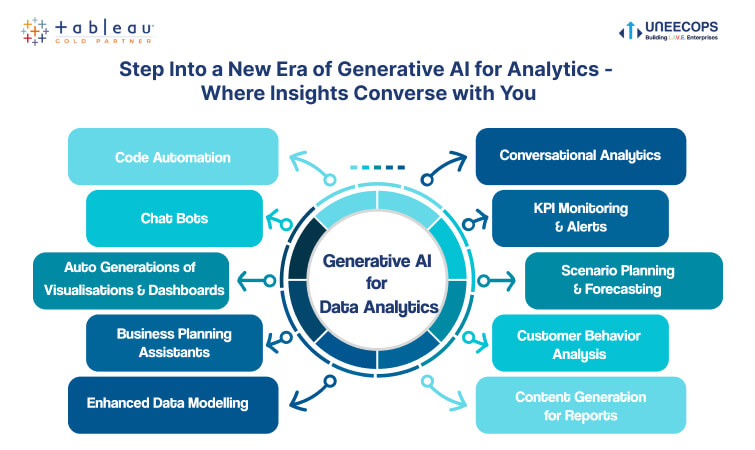Every organization has a set of goals and objectives to achieve in order to attain success. The goals and objectives often align with the organization’s mission and vision, thus guiding teams in the right direction. Different teams take different approaches to reach their goals, but each approach involves gathering of necessary data, especially in today’s digital age.
Data is a critical part of every organization and is used to extract invaluable actionable insights that can take firms on the right path toward success. As more and more companies began to realize the importance of data, effective tools like Business Intelligence and Analytics gained popularity.
Effective decision-making through Business Intelligence and Analytics increases opportunities for profitability, internal process optimization, new revenue streams, business problem detection, and market trend identification.
What BI and Analytics Means to Business
Business Intelligence refers to a technology-driven process that helps analyze and represent data in any business setting with the help of workable strategies and applications. It enables the important stakeholders in the company to make informed decisions about various procedures of the company. It helps create new opportunities to expand the business, increase returns, and boost the ultimate turnovers. Business Intelligence encourages easy representation and interpretation of data so that effective strategies can be developed for business stability. Different kinds of Business Intelligence tools and methodologies are used for this purpose.
Analytics, on the other hand, streamlines data in order to steer its value in the right direction. It turns large volumes of data into smaller chunks of information and insights to provide real-time figures.
The global market size of Business Intelligence and Analytics is projected to reach USD 72.32 Billion by 2030.
Source by Verified Market Research
Whether separate or combined together, BI & Analytics offer multiple benefits to organizations. In this article, we will talk about why entrepreneurs are opting for BI and Analytics strategies in 2023 by discussing their benefits and the latest trends. Let’s begin.
Why are Entrepreneurs Opting for BI and Analytics Strategies in 2023
In 2023, entrepreneurs are opting for Business Intelligence (BI) and Analytics strategies for a variety of reasons, including:
- Better decision-making: BI and Analytics provide valuable insights and data-driven decision-making capabilities that help entrepreneurs make informed decisions and stay ahead of their competition.
- Increased efficiency: BI and Analytics can automate many manual processes, streamline operations, and help businesses become more efficient.
- Improved customer experience: By using BI and Analytics to track customer behaviour and preferences, businesses can tailor their offerings and enhance the customer experience.
- Better understanding of market trends: BI and Analytics help businesses stay up-to-date with market trends and consumer behaviour, allowing them to quickly adjust their strategies to stay ahead of the competition.
- Increased profitability: By using BI and Analytics to optimize operations, reduce costs, and increase sales, businesses can improve their bottom line and become more profitable.
- Competitive advantage: BI and Analytics give businesses a competitive advantage by providing real-time insights and data-driven decision-making capabilities.
Benefits of Adopting Business Intelligence in Your Business
Some essential benefits of adopting Business Intelligence in your business are:
- Improved Business Performance
Business Intelligence represents information through data visualization, which makes it easier to:
- read data
- interpret or understand data
- observe trends
- identify the practices that are consistently yielding fruitful results
- detect loopholes and work ways to bridge them
Through Business Intelligence, it becomes easier to make informed decisions and ultimately improve business performance.
- Accurate Information
Business Intelligence leverages operational and financial data to ensure accuracy while generating reports, written information, and visual representations. As a result, every vital stakeholder receives accurate information at all times and is informed about every change, whether major or minor.
- Trend Identification
With Business Intelligence, organizations can identify future trends by examining the following:
- industry activities
- markets
- competitors
- strengths and weaknesses (of competitors as well as the company itself)
- past trends
With such impactful evaluations, recognition of future trends and eventual capitalization on opportunities can be positively expected. The trend identification can help leaders gain a competitive advantage and ensure business success.
- Risk Management
Risk management is a critical element of every organization. Irrespective of the industry in which an organization runs, effective risk management measures are crucial to implement. With Business Intelligence, organizations can identify and reduce their respective risk factors, such as fraud or cyber-attacks in the most effective ways possible.
- Effective Budgeting
Business Intelligence enables organizations to perform effective budgeting practices by:
- increasing optimized performances
- identifying areas where costs can be cut or money can be saved
- increasing operational efficiency to increase profits
- identifying new revenue streams for more income flow
Benefits of Adopting Data Analytics in Your Business
Here are some essential benefits of harnessing the power of Data Analytics in your business:
- Effective Business Evaluation
Data Analytics allows approximation as well as investigation of information in order to provide a solid foundation to anticipate future conditions. It facilitates the comprehension & interpretation of the firm’s existing business condition along with the current condition of the market landscape. Accordingly, it necessitates the required steps to match the market demands, such as the development of new products or the introduction of innovative services.
- Targeted Content Releases
Data Analytics allows firms to understand what customers want ahead of time by giving insights based on patterns in customer data. Business leaders can divide their client bases into segments on the foundation of shared preferences and release targeted content for better persuasion.
Targeted content releases help businesses optimize marketing costs and optimize the marketing campaigns overall. Additionally, it helps ensure what kind of marketing strategies are most suitable for which client base.
- Operational Efficiency
Data Analytics helps identify potential difficulties in operations. Additionally, it also helps identify better approaches toward dealing with those difficulties in order to optimize the operations. Thus, it increases operational efficiency and boosts benefit levels.
- Value Chain Evaluation
Data Analytics help extract insights from a company’s internal value chains and highlight the key ways through which the company can limit its challenges and boost its success.
- Industry Expertise
Data Analytics can help firms gain industry expertise by enabling them to learn about the industry’s potential future patterns along with their own. This provides a competitive advantage over competitors and allows leaders to proceed with their business strategies thoughtfully.
Emerging BI & Analytics Trends for 2023
- Predictive Business Analytics and Continuous Intelligence will grow: Businesses can be expected to embrace continuous intelligence for better real-time solutions. Even with varying data sources, velocity, and volume, companies can accelerate Analytics and decision-making with the help of the modern machine-learning-driven approach offered by predictive business Analytics and continuous intelligence.
- Explainable Intelligence will rise: Explainable intelligence will increase, primarily as Business Analytics will be largely dominated by processes based on Artificial Intelligence & Machine Learning. Explainable intelligence will entail the automatic generation of an explanation for every decision being taken by citing statistics, attributes, accuracy, and other relevant collateral.
- Business Intelligence will be more accessible with Augmented Analytics: Augmented Analytics refers to the use of AI & ML to help with insight generation, data preparation, and insight explanation to ‘augment’ how users will explore and analyze data in BI platforms. Augmented Analytics solutions will make Business Intelligence more accessible by:
- Helping crucial stakeholders understand business contexts in a better way.
- Uncovering insights by answering relevant questions quickly.
- Helping analysts perform a thorough analysis.
- Enabling users to perform advanced data preparation tasks, even the ones who lack deep analytical expertise.
- Futuristic data security and governance: More defensive Artificial Intelligence developments for security measures can be expected in the Business Intelligence domain:
- Continuous development of proactive mechanisms to detect system anomalies I advance.
- Advancements in data governance for quality assurance of business assets. The use of auditing, role-based access, and authentication protocols can be expected to ensure the quality.
- Accurate, unique, and up-to-date data will be maintained and leveraged as a reliable way of boosting reputation and revenue.
Let’s Talk
Business Intelligence and Analytics strategies are important in today’s business landscape. In order to grow profitably, it is crucial to rely on a comprehensive means of generating predictions and growth-oriented strategies characterized by accuracy.
Business Intelligence and Analytics play a critical role in transforming the collected data into rich insights to facilitate faster and more informed decision-making. Additionally, the amalgamation of their own individual benefits and the benefits of implementing them together helps businesses enhance ROI. Smarter decisions can be made while saving money, time, and human resources. All these reasons contribute to the rising use of BI and Analytics strategies among entrepreneurs in 2023.
Get in touch with Team Uneecops for complementary Dashboard Evaluation.







